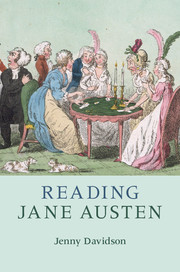
-
Select format
-
- Publisher:
- Cambridge University Press
- Publication date:
- 21 December 2017
- 07 December 2017
- ISBN:
- 9781108367974
- 9781108421348
- 9781108431835
- Dimensions:
- (228 x 152 mm)
- Weight & Pages:
- 0.4kg, 172 Pages
- Dimensions:
- (228 x 152 mm)
- Weight & Pages:
- 0.29kg, 172 Pages
You may already have access via personal or institutional login- Series:
- Reading Writers and their Work
Book description
Whether you're new to Austen's work or know it backwards and forwards already, this book provides a clear, full and highly engaging account of how Austen's fiction works and why it matters. Exploring new pathways into the study of Jane Austen's writing, novelist and academic Jenny Davidson looks at Austen's work through a writer's lens, addressing formal questions about narration, novel writing, and fictional composition as well as themes including social and women's history, morals and manners. Introducing new readers to the breadth and depth of Jane Austen's writing, and offering new insights to those more familiar with Austen's work, Jenny Davidson celebrates the art and skill of one of the most popular and influential writers in the history of English literature.
Awards
Winner, 2018 Choice Outstanding Academic Title
Reviews
'Davidson’s close readings are delightfully fresh, designed to provide formal accounts of how Austen’s fiction functions for the specialist and the common reader alike.'
Gillian Dow Source: The Times Literary Supplement
'In this deft study, Davidson provides fascinating details about how Austen's novels were written and the world in which they were composed so modern readers might enjoy them even more. … Densely packed with vital information, this slim volume is hard to put down.'
R. Shapiro Source: Choice
'Reading Jane Austen offers a useful guide through the intricacies of Austen’s works and world for undergraduate students and meticulous Austen fans; a quick, smart, satisfying read for Austen scholars; and nuanced musings on the nature and function of novel reading for all. For that audience, Reading Jane Austen provides comprehensive historical contextualization of Austen’s writing in terms of social practices and ideologies, deploying biographical information about Austen as well as analogies to our own time.'
Jodi L. Wyett Source: Eighteenth-Century Fiction
Contents
Guide to Further Reading
Eighteenth-Century Novels Mentioned in the Text
Novels by Some of Austen’s Female Contemporaries
Contexts on Gender and Politics
Austen’s Reception and Posthumous Reputation
Austen Criticism
Literary Criticism on Related Topics
Novels and Narration
Austen and the Social Sciences
Metrics
Altmetric attention score
Full text views
Full text views help Loading metrics...
Loading metrics...
* Views captured on Cambridge Core between #date#. This data will be updated every 24 hours.
Usage data cannot currently be displayed.
Accessibility standard: Unknown
Why this information is here
This section outlines the accessibility features of this content - including support for screen readers, full keyboard navigation and high-contrast display options. This may not be relevant for you.
Accessibility Information
Accessibility compliance for the PDF of this book is currently unknown and may be updated in the future.


